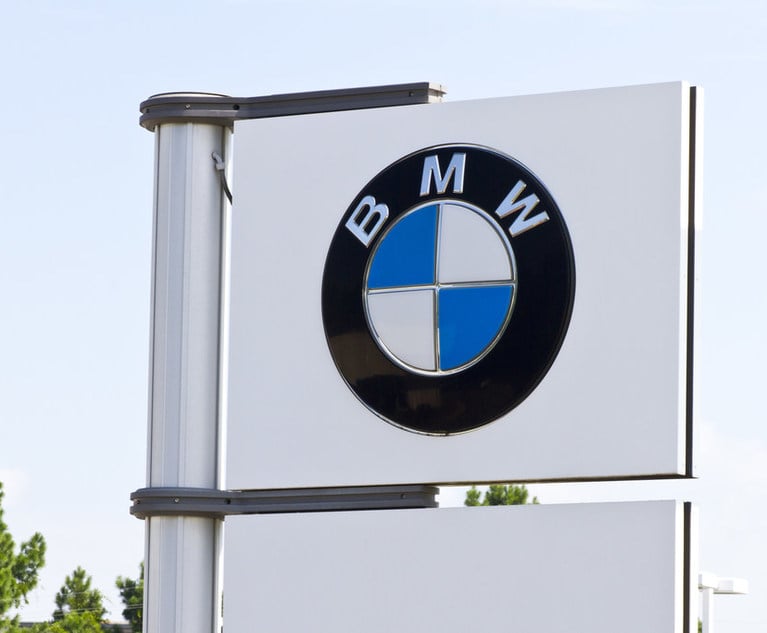A putative class action against BMW of North America alleging the company knew of electrical defects in its vehicles but failed to warn regulators or the public will continue in federal court, a U.S. District Court judge held last week.
Multiple plaintiffs, including a consolidated class action complaint brought by Gabriel Patlan, Wendy Vasquez and Vikkie Wilkinson, filed lawsuits against BMW in U.S. District Court for the District of New Jersey. The plaintiffs alleged their vehicles had defective blower-motor wiring systems and valve heaters which caused their vehicles to “spontaneously combust and catch fire,” even when the vehicles are not in operation, according to the opinion filed March 28.
The plaintiffs relied on the assertion that BMW affirmatively misled and improperly concealed the defects in purchased vehicles. They claim BMW failed to accurately represent the safety of the vehicles and assert that BMW violated its 48-month/50,000-mile warranty with the sale of the defective vehicles.
While the court sided with BMW on one count of breach of express warranty, the judge declined to dismiss the plaintiffs’ other claims, including allegations of consumer fraud, unfair competition, false advertising violations out of California, New Jersey and Nevada, along with a Magnuson-Moss Warranty Act claim. The plaintiffs’ class action suit is seeking damages, restitution and equitable relief due to BMW’s allegedly fraudulent business practices.
BMW argued that the plaintiffs claims are prudentially moot since its recall programs provided complete relief to the vehicle owners, and called some of the plaintiffs’ damages “totally speculative.” The automotive company also said the plaintiffs did not sufficiently allege that BMW had knowledge of a common defect as early as 2011 and 2012.
U.S. District Judge Claire E. Cecchi sided with the plaintiffs, rejecting BMW’s claims that the Patlan plaintiffs’ allegations were insufficient, as the three plaintiffs plausibly alleged that their vehicles sustained a decrease in value as a result of the defects existing at the time of purchase, issues with a positive crankcase ventilation component and alleged out-of-pocket expenses, including failure to provide a rental vehicle.
The Patlan plaintiffs, which include Gabriel Patlan, Ryan Cornell and La Della Levy, all purchased BMW 328i vehicles with differing production years, but each plaintiff claimed to have purchased the cars based on BMW’s messaging regarding manufacturing quality and safety commitments. Patlan and Cornell say they were informed about the defects but were later told BMW could not repair the vehicles.
Levy alleged that her vehicle was destroyed by a fire while the car was not in operation, but BMW claims the plaintiff’s claims are “too speculative,” the opinion said.
Cecchi disagreed, holding that Levy’s allegations fell within the parameters of a recall in which the National Highway Traffic Safety Administration safety recall report showed that BMW had received reports of vehicles catching on fire.
In 2017, BMW recalled about 1.4 million vehicles after ABC News ran an investigation into vehicles spontaneously combusting. A safety recall report from the NHTSA showed the agency first received reports of fires in 2007 and 2008, with the reports of additional fires originating in the cars’ heating and cooling systems through 2011. In May 2011, BMW changed the design of the blow-regulator, but it did not notify customers of the defect, correct it in already-purchased vehicles or notify the agency, the opinion said.
Natalie Finkelman Bennett and James C. Shah, of Miller Shah in Hoboken; Catherine E. Anderson, of Giskan Solotaroff & Anderson in New York; and Roosevelt N. Nesmith, of Bloomfield, are representing the plaintiffs.
Christopher J. Dalton, Jacqueline M. Weyend, Argia J. DiMarco and Melissa Bayly, of Buchanan Ingersoll & Rooney in Newark, are representing BMW.
Counsel for both parties did not return a request for comment.


